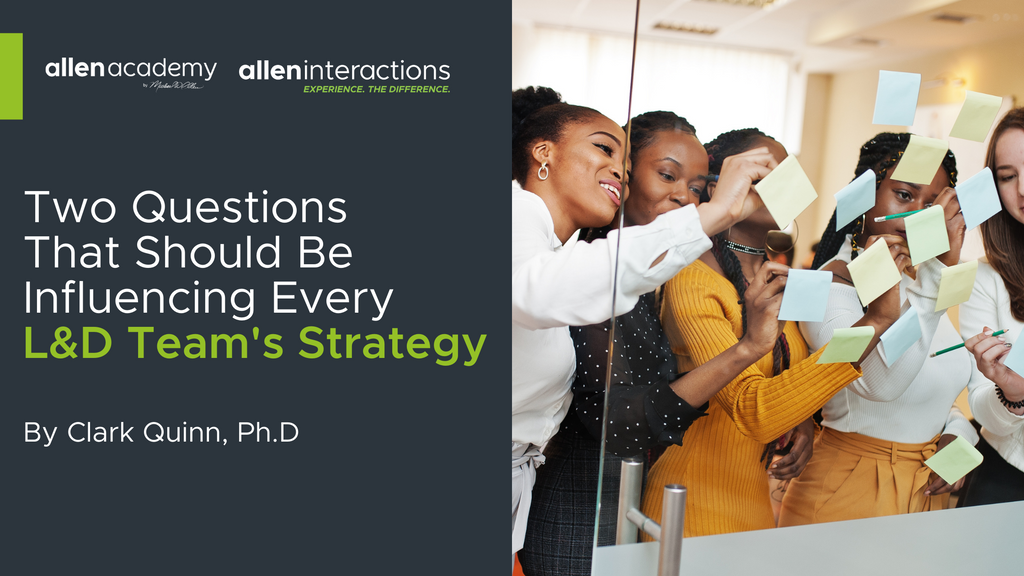Two Questions That Should Be Influencing Every L&D Team's Strategy

By Allen Academy Instructor, Clark Quinn Ph.D.
Recently, one of our colleagues wrote "The art of being a successful corporate training professional has little to do with academic studies of neuroscience, psychology, sociology, and the other -ologies. It's fun to learn these things, but you will spend less than 10% of your work applying them.” Not surprisingly, it touched off a bit of a discussion, with colleagues weighing in. With a vested interest (a book out on learning science, workshops on learning science, etc.), I wasn’t sure I could participate. However, I can write about the importance of learning science, particularly where we’re going.
This poses two questions: Does learning science play a role in our work, and, just how much of an impact does it have on our profession? I want to address both. Then, I’ll riff about the direction things are moving, and why it’s ever more important.
First of all, do we really need to know about learning science? That includes psychology, sociology, and more about how we learn. It seems obvious that we should, but let’s see about the alternative. Why can’t we just follow the dictates of instructional design? The problem with that is that there are many ways in which instructional design precepts fall short. They can’t cover every new situation and every new technology we face.
As some weighed in with, when a client wants their project done in a particular way, all the learning science you can cite won’t make a difference. Yet, in my experience, it can. Although there are no guarantees, there are times I’ve been able to make a case and shift their design choices towards a more evidence-informed stance. Others mentioned it is a stronger argument for the client to agree that this was being done against the recommendations of the designer. You can’t do that unless you know the science. That is, you can’t know when to push back, and what’s counter-productive to agree to.
We must be able to see the gaps in our instructional design, which learning science helps to support. It also gives us a basis to infer how to use new technologies. If we want to avoid doing slide presentations, we have to know what cognitive (and emotional) advantages these technologies have so we can leverage them for success. The same goes for any new solution vendors want to flog. There are a host of things being bought and sold that really have no basis. How do you prevent wasting money on them if you can’t understand the tradeoffs?
I think we’ve created a solid basis for a role for learning science, but how much will this impact your work? Of course, this depends on your role. If you’re an LMS administrator, you may not refer to learning unless there are new features to evaluate. But, as an instructional designer, it ought to occupy most of your day through:
· Analysis: ensuring that you’re asking the right questions
· Design: creating experiences that will have an impact
· Evaluation: knowing what elements are contributing to problems.
Some will say we have to deal with business pragmatics. When we’re asked for a course, we’re expected to deliver. We attend a lot of meetings, write a lot of documents, etc. However, I’ve argued strongly that what’s most critical is the ability to make better decisions. The decisions we make determine our success. We make better decisions about learning when we know how learning works. It may not be all the time, but they will be the most impactful decisions when leveraging evidence-based approaches to our work. If we don’t have the foundation for learning-grounded decisions, the important ones not be made on a solid basis.
Fortunately, learning science has been gaining momentum. We’re growing awareness of learning science; the rate of relevant books emerging has mushroomed. Others will know, and we can lose out if we don’t. Also, as things move faster and we deal with more change, we have to adapt and identify where old approaches are no longer effective. We’ll have to be more flexible, and that requires being based upon a sound foundation.
There is an increasing rate of new announcements from technology (all the xRs), learning science (situated, distributed, meta-cognition, …), and approaches (SAM, LCD, Llama, …). Similarly, there continues to be an onslaught of buzzwords that we should be aware of: neuro, empowerment—it seems we’re always creating new labels and keywords. Regardless of its latest terminology, we need to be able to see past the hype and be able to evaluate the claims.
There are, of course, personal benefits from understanding learning science. Knowing how others learn means you’ll also know how you learn. You can apply this awareness to your own learning as well as to your team, those you serve, and your organization. We all need to be learning, going forward. Each of us, and our groups, together. You do this best if you know learning. I truly believe, and hopefully have convinced you, that it’s maybe the most important thing L&D can know. So, learn learning science. You don’t have to learn it from me, but I believe you do have to learn it.
Give your organization the evidence-based strategy it needs to achieve your performance goals with Allen Academy's Effective Learning Strategies course with Clark Quinn. This five-week course will arm you with the background, application, and strategies that you need to use the power of cognitive science to create smarter, more successful learning that supports your learners' needs.

